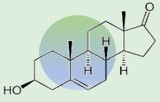Dehydroepiandrosterone (DHEA) is a vital steroid hormone produced mainly in the adrenal cortex, impacting numerous physiological processes.
Key Functions and Regulatory Mechanisms
Hormonal Precursor: DHEA acts as a precursor to androgens and estrogens, influencing metabolism, immune function, and neuroprotection. DHEA synthesis is controlled by the hypothalamic-pituitary-adrenal axis. Corticotropin-releasing hormone stimulates the anterior pituitary to secrete adrenocorticotropin hormone (ACTH), which then stimulates DHEA production in the adrenal cortex. DHEA levels peak in the morning, following the circadian pattern of ACTH secretion, and decline with age.
Cellular Functions: Besides being a precursor for sex steroids, DHEA binds directly to steroid hormone and nuclear receptors, activating various membrane receptors and inhibiting voltage-gated T-type Ca2+ channels. It can also regulate the expression and secretion of adipokines like leptin, adiponectin, and resistin.
Research Applications and Clinical Significance
Metabolic and Cardiovascular Health: Research indicates DHEA may modulate endothelial function, reduce inflammation, improve insulin sensitivity, enhance blood flow, and support cellular immunity.
Endocrine Function: Studies suggest DHEA may benefit those with hypoadrenalism, mainly in restoring androgen levels. DHEA supplementation has shown promise in improving pregnancy rates and decreasing abortion frequency.
Neuropsychiatric Benefits: DHEA has demonstrated anxiolytic, antidepressant, and antiglucocorticoid properties. It has been found to enhance emotion regulation neurocircuits, reduce activity in the amygdala and hippocampus, and improve connectivity between these regions. DHEA may enhance mood, energy, well-being, and stress resilience.
Age-Related and Bone Health: It has been explored for its potential in addressing age-related disorders, sexual dysfunction, and adrenal insufficiency. DHEA promotes osteoblast differentiation and proliferation, regulates the RANKL/OPG ratio, and inhibits osteoclastogenesis and bone resorption, suggesting a role in bone health.
Preventative Effects: DHEA has demonstrated beneficial effects such as preventing diabetes mellitus, obesity, cancer, and heart disease in laboratory animals.


